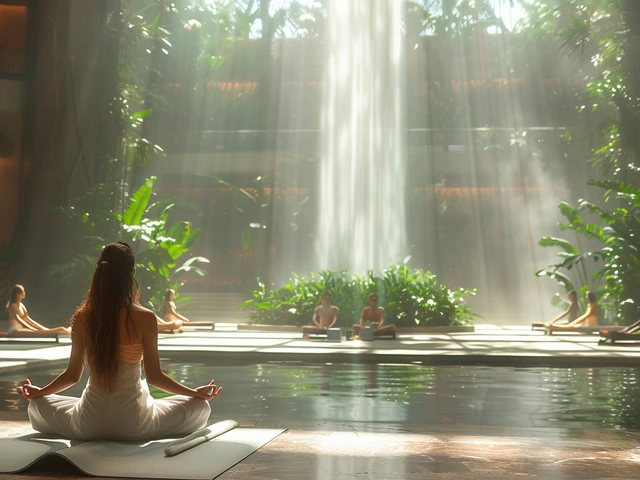Meditation, with its roots reaching deep into history, has blossomed in modern culture as a solution to the relentless rush of daily life. It’s not just about sitting silently; it’s a journey towards inner silence that can dramatically transform everyday experiences. While many embark on this path with goals of stress reduction and mental clarity, the benefits extend much further.
In our fast-paced world, taking time to meditate can seem like a luxury, but it's truly a necessity for maintaining mental balance and wellness. Engaging in meditation regularly not only soothes the mind but also reforms our overall life perspective, nurturing a tranquil mental environment.
- Introduction to Meditation
- Scientific Benefits
- Getting Started: Basic Techniques
- Deepening Your Practice
- Common Challenges and Solutions
- Success Stories
Introduction to Meditation
Meditation, often perceived as a deeply personal practice, has been utilized across various cultures and religions for thousands of years. Initially rooted in religious and spiritual traditions, meditation has evolved into a widespread secular practice that individuals from all walks of life use to enhance their health and well-being. The fundamental premise of meditation involves directing one's focus away from the surrounding distractions to achieve a mentally clear and emotionally calm and stable state.
Historically, the practice finds its origins in ancient India, within the Vedas, the oldest texts of Hinduism, and has significant ties to Buddhism and Taoism. In these contexts, meditation was seen not just as a method for relaxation, but as a critical path to enlightenment and self-realization. As the world has become more interconnected, these traditional techniques have spread globally, adapting to modern needs and scientific scrutiny.
In contemporary times, meditation has been embraced by millions as an antidote to the high-stress environments of modern life. Techniques vary widely, from mindfulness meditation, which involves paying attention to breath and body sensations, to transcendental meditation, which uses a repeated mantra to quiet the mind. Schools and workplaces have begun incorporating these practices to support mental health and enhance productivity, recognizing the substantial benefits that meditation can offer.
One of the most compelling aspects of meditation is its accessibility. It requires no specialized equipment and can be practiced by anyone, anywhere, at any time. Whether it's a few minutes during a lunch break or a dedicated hour at home, the flexibility of meditation makes it particularly appealing in our busy world. It's a tool that not only affords peace but also fosters resilience against the pressures of daily life.
Scientific Benefits of Meditation
The profound effects of meditation on the human mind and body are not just anecdotal; they are well-supported by numerous scientific studies. Research conducted over the past several decades indicates that regular meditation can alter the brain's structure, making it more efficient at managing stress and emotions. For instance, neuroimaging studies show increased gray matter density in parts of the brain associated with memory, sense of self, empathy, and stress. Each finding punctuates the profound impact meditation can have, not just spiritually, but tangibly and neurologically.
One landmark study published in the Journal of Neuroscience demonstrated that eight weeks of mindfulness training significantly reduced the brain’s emotional reactivity to distressing images, which was evident through reduced activation in the amygdala, known as the brain's 'fight or flight' center. This direct correlation between meditation and reduced stress responsivity offers a promising insight into how mindfulness can lay a solid foundation for emotional resilience and mental health.
Beyond emotional regulation, meditation benefits also spill over into physical health. Regular practitioners report lower blood pressure, reduced symptoms of chronic pain, and better immune response. These changes are believed to be linked to meditation’s ability to decrease the production of stress hormones, which are often culprits in exacerbating chronic health conditions. Bones are tossing around how meditation improves not just our mental state but our cellular wellness too.
Another area in which meditation shows promising benefits is cognitive function. Studies suggest that meditation not only helps preserve the aging brain but also enhances concentration and attention. This is particularly invaluable in today’s distraction-laden world where sustained attention is a rarity. Memory performance, especially working memory, can also see improvements after consistent practice of mindfulness and meditation.
Meditation also scales up the quality of life by enhancing feelings of happiness and contentment. This might be correlated to increased production of neurotransmitters like serotonin and dopamine during meditation sessions. As these ‘happiness’ chemicals play a crucial role in mood regulation, it’s no surprise that meditators often report higher levels of overall satisfaction and lower rates of depression-related symptoms.
Given this wealth of benefits, it's crucial to recognize meditation not just as a spiritual practice but as a strong component of lifestyle medicine. More than ever, it stands out as a valuable tool in the preventive healthcare kit, touching lives by buffering the stressors of modern existence and enhancing overall wellbeing.
Getting Started: Basic Techniques
Meditation might seem intimidating at first glance, with its aura of silent concentration and mystic tranquility. However, the core of meditation is quite simple: it is the practice of paying attention and becoming deeply aware of your present moment. For those new to this practice, the simplicity begins with basic techniques designed to ease you into this new state of awareness. Everyone starts somewhere, and the beauty of meditation is its accessibility regardless of experience or background.
Let's break down these techniques step by step. First and foremost, establish a consistent schedule. Decide on a specific time each day, whether morning or evening, to dedicate to meditation. This repetition builds a habit that will anchor your practice in your daily routine. Next, find a quiet place where you will be undisturbed. This could be a designated corner of your room, a peaceful garden spot, or even a quiet park bench. The key is consistency in location which helps in creating a tranquil mental space over time.
Focusing on Breath
One of the most foundational techniques in meditation is focusing on your breath. This practice involves simply observing the natural inhalation and exhalation of your breath. Sit in a comfortable position, close your eyes, and start to notice your breathing. Feel the air enter through your nostrils, fill your lungs, and then slowly escape. This method not only helps in grounding your focus but also calms the restless mind, creating a meditative state that enhances mindfulness.
Breath counting is another effective technique to maintain this focus. In this method, you count each exhale until you reach ten and then start again. This simple act of counting assists in warding off distractions and deepening your meditation practice. It’s a concrete way to keep your mind engaged and actively participating in the meditation process.
For many, visualisation enhances the meditative experience. In this technique, imagine a peaceful scene, a quiet lake or a gentle sunrise. This not only aids in focus but also instills a sense of inner peace and relaxation. It's beneficial to use such imagery especially when finding tranquility is a challenge.
Lastly, integrating gentle background music or nature sounds can further enhance the ambient atmosphere, fostering a deeper meditative state. Just ensure the volume is low so as not to overpower your focus on breathing. Remember, the key is not to force any state but to allow yourself to gradually enter deeper states of relaxation and mindfulness. As you continue to practice these basic techniques, you will notice a greater ease not only in your sessions but also in your everyday stress levels and mental clarity.
In summary, starting meditation doesn't require any special equipment or complicated teachings. It begins with simple steps: consistent scheduling, a comfortable and quiet environment, focused breathing techniques, visualization, and possibly the soft hum of calming music. By sticking to these basics, you lay a strong foundation for a fruitful meditation practice that can significantly enhance your quality of life.
Deepening Your Practice
Once the basics of meditation are comfortably in your routine, the next step is to deepen your practice. This progression isn't just about increasing the time you spend meditating, but rather enhancing the quality of your sessions. It involves cultivating a deeper awareness and connection with yourself, which can profoundly impact your overall sense of well-being. As you venture into this deeper experience, you'll notice subtle shifts in your perception and emotional responses, indicating a growing mastery over your mind and its patterns.
One powerful method to enhance your meditation practice is to incorporate mindfulness throughout your day, not just during scheduled meditation times. This means paying full attention to whatever you are doing, being fully present in each moment. Whether you are eating, walking, or even engaging in conversation, mindfulness involves being aware of the sensations, emotions, and thoughts that arise. The beauty of this practice is that it turns ordinary activities into profound meditative exercises, deepening your sense of awareness and serenity.
To advance your meditation journey, it is also crucial to engage regularly with a community or a mentor who can provide guidance and support. Whether it is through online forums, local meditation groups, or workshops, connecting with others offers motivational insights and advice that can challenge and inspire your practice. This social aspect of meditation often introduces new perspectives and techniques, enriching your experience and encouraging consistency.
Common Challenges and Solutions
When first exploring the realm of meditation, many individuals encounter a variety of obstacles that can make the practice seem daunting. One frequent challenge is struggling to find time in an already packed schedule. This can create feelings of frustration or inadequacy which ironically, only heightens the stress it aims to alleviate. However, the solution lies in starting small. Even five minutes of meditation can prove beneficial, and it can often be integrated into daily routines, such as during a morning shower or on a brief walk.
Another common hurdle is the misconception that to meditate effectively, one must completely clear their mind of thoughts. This, for most beginners, is an almost impossible task and can lead to feelings of failure. It's important to realize that meditation is not the absence of thought, but rather the management of it. A useful technique is to focus on one’s breathing or on a specific object or sound. Each time the mind wanders, gently bring it back without self-judgment. This centers the practice on observation and awareness rather than the pressure to achieve a 'blank mind.'
Distracting environments can also impede meditation outcomes. The sounds of urban life, interruptions from family members, or even digital notifications can all break concentration. The key is creating a dedicated space for meditation. It doesn’t have to be large or elaborate—a corner of a room or a specific chair can suffice. The essence is to have a physical 'zone' that your mind and body begin to associate with meditative practice, enhancing your ability to slip into a meditative state with greater ease.
Physical discomfort is another barrier often faced by newcomers. Sitting for long periods might lead to soreness or stiffness, particularly in those who are not accustomed to such poses. To address this, it’s crucial to ensure comfort during meditation. This may involve using cushions, practicing on a comfortable chair, or experimenting with different postures such as lying down. The focus should be on comfort and breath, allowing the body to relax into the practice naturally.
Finally, many face emotional challenges such as surfacing of suppressed feelings or a heightened sense of vulnerability. While confronting these emotions can be difficult, it is also a part of the process that ultimately leads to greater emotional resilience and understanding. Encouraging a practice of gentle acceptance and compassion towards oneself can make this aspect of meditation less overwhelming. With persistence, these emotional waves tend to lessen and become an integral part of the healing that meditation offers.
Success Stories
The transformative effects of meditation are not just subjects of study but also vividly illustrated through personal stories from individuals around the world. Take James, a former financial analyst who struggled with severe stress and sleep disorders. By integrating mindfulness and meditation into his daily routine, not only did his sleep quality improve, but his general anxiety levels significantly decreased. His recount of the journey describes a marked increase in his clarity of thought and an ability to handle stress at work with remarkable calmness.
Maria, a school teacher from Spain, shares a similar tale of transformation. Overwhelmed by the demands of her profession and personal life, she turned to meditation as a last resort. Within months, Maria reported enhanced emotional resilience, increased patience, and a newfound joy in her daily interactions. Her story is a testament to the power of meditation to reinvent one's emotional landscape and interpersonal relationships.
Among notable figures, celebrity endorsements have also shed light on meditation’s widespread appeal. Media Mogul Oprah Winfrey has often spoken about how meditation has been a 'game changer' for her, helping to focus her mind and expand her appreciation for life.
"Meditation lets me step back and gain a fresh perspective," says Oprah, emphasizing its role in her successful career and personal happiness.
These stories not only highlight the personal benefits but also underscore a pattern of transformative outcomes across different professions and lifestyles. Each account, unique in its context and challenges, converges on a common theme: meditation offers a path to a more peaceful, focused, and enjoyable life.






